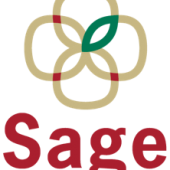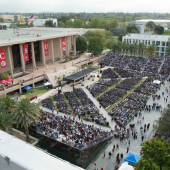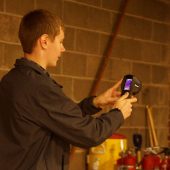
The purpose of this paper is to describe the application of a sustainable learning framework through a community-based project in the Southern California region. The Sage Project is a partnership between San Diego State University (SDSU) and a local government in San Diego, California. The framework promoted educational innovation by allowing students to utilize existing courses and focus on partner-identified real-world projects to help advance the needs of partnering cities. Recognizing the need for air quality research in the partner cities and after consulting with both local governments regarding their environmental needs, SDSU graduate students were able to conduct research and communicate their results concerning air quality in a manner that benefits local community stakeholders, as well as, the university and students involved. Through the assembly and quantification of air pollution data, graduate students provided a brief snapshot of air quality trends in partnering cities to establish a foundation of air quality results to be used toward generating mitigation strategies to reduce particulate matter air pollution. By providing never before conducted air quality research in both communities through a sustainable educational model, both community partners and students benefited through enhanced research and community engagement opportunities while community partners obtained valuable and informative research, ideas, and solutions concerning their community needs. This paper provides a demonstration of the ability for project-based curricula facilitated through a community and university partnership to be replicable in higher education coursework.
Continue Reading
To assess the sustainability literacy of students at California State University, Northridge (CSUN), we administered a modified version of the Assessment of Sustainability Knowledge (ASK) to 2,993 students in 60 courses over 5 semesters. CSUN is a large minority-serving institution with a regional focus. Within the general student population, students gain about 2.7 percentage points each year as they progress from freshman to senior year. For each sustainability-related course they take (up to 3), they also gain an average of 2.7 percentage points. Within our core sustainability courses, students gain an average of 11.6 percentage points from pre-test to post-test. Students enter CSUN with a statistically significant gender gap in sustainability knowledge with males having average scores 7.6 percentage points higher than females, but the gender gap closes completely by completion of coursework in a sustainability minor program. Our students enter college with less sustainability knowledge than those in two other more selective institutions who conducted similar surveys (Ohio State University and Wartburg College) but gain knowledge at a similar rate. We also find that students with more prior sustainability knowledge self-select into sustainability courses and that students from different majors improve sustainability knowledge at different rates when taking related courses.
Continue Reading
This paper presents best-practices for client-oriented project based learning (PBL) based on building audits used to impart practical sustainable engineering skills. Insights were gained over years of natural reflective practice during which students conducted off-campus building audits for the New Jersey Department of Military and Veterans Affairs. Few studies have explored the use of off-campus building audits with real clients in project based learning courses. A survey of students from recent semesters, plus tangible outcomes, are used to evaluate success. The building audits are valued by students and clients. Best-practices contributing to the success of the building audit course are described which can be used by any PBL practitioner. Critical best-practices pertain to training, deliverables, a report template, a submit-review-resubmit cycle, and regular interaction between undergraduate students, graduate student, faculty, and client staff. In particular, repeated cycles of submitting reports, getting comments, and resubmitting appear to be vital to both student learning and client satisfaction. On average, student teams submitted their major report 3.75 times and received comments 3.9 times.
Continue Reading